Published on June 4, 2025
The IAF is proud to introduce the 2025 IAF Emerging Space Leaders!
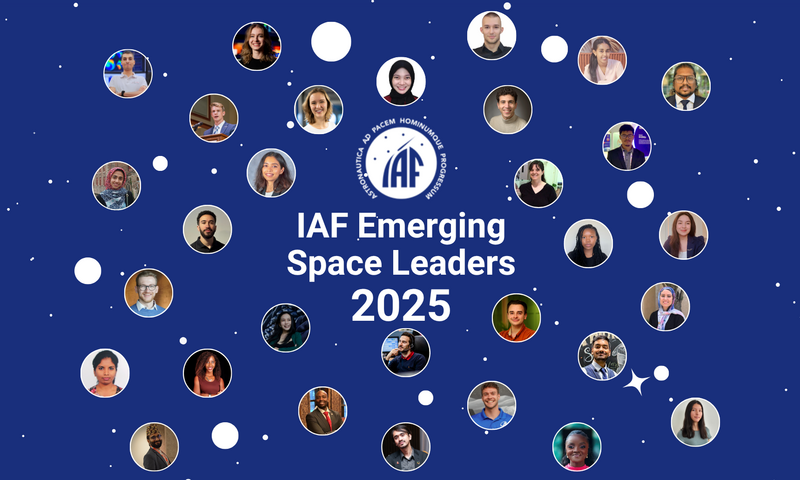
We are pleased to introduce the brilliant students and young professionals who will receive a grant to participate in the 76th International Astronautical Congress (IAC 2025) taking place in Sydney, Australia from 29 September to 3 October 2025.
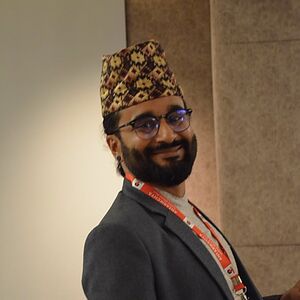
Rishav Adhikari
Hi, my name is Rishav Adhikari, and I am currently working as the Project Lead of Slippers2Sat—Nepal’s first middle school 1U CubeSat initiative by Antarikchya Pratisthan Nepal (APN). The S2S project is more than just launching a satellite; it’s about opening access to space science and hands-on tech experiences for students from marginalized, impoverished, and indigenous public schools in Nepal. I’m helping build an inclusive and innovative space community here at home. I earned my MSc in ESPACE from the Technical University of Munich (TUM), where my thesis focused on the Observation of Earth’s Gravity Field with CubeSats. During my time there, I was part of the Mission Design team for DEDRA (now MOVE-III), which deepened my interest in CubeSats. Before that, I completed my BEng in Aeronautics (Aircraft Design) from Nanjing University of Aeronautics and Astronautics. Working with APN has taken me to various parts of Nepal, where I’ve conducted hands-on space science and satellite training through programs like NATCOM UNESCO’s week-long Tinkerlab Science Club Training and the E-Cube Satellite Training. These experiences have allowed me to connect with students from diverse backgrounds and have only strengthened my commitment to making space education accessible across the country. I’m also a passionate public speaker and storyteller. I love listening to and sharing stories about people’s lives, their struggles, and their dreams. Recently, I’ve been working to bridge that passion for storytelling with space science because I believe the stories we tell can not only honor where we’ve come from, but also inspire where we’re headed.
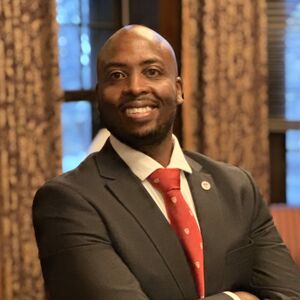
Arnold Agaba
Dr. Arnold Agaba is a Ugandan-born lawyer and academic specializing in air and space law, with a focus on advancing the field in Africa. He holds a PhD and Master of Laws in Air and Space Law from McGill University, a Master of Laws in US Legal System and International Law from the University of Cincinnati, a Bachelor of Laws from Uganda Christian University, and a Diploma in Legal Practice from Uganda’s Law Development Centre.
Dr. Agaba lectures at McGill University and several Ugandan universities. He is a member of the Uganda Law Society and the East African Law Society, where he chairs the Air and Space Law Committee and he serves as Chair of the Research Group on Air and Space Law in Africa. He is dedicated to legal education and capacity building, leading training and research programs for African professionals in aviation and space governance.
His research explores how African states develop legal and institutional frameworks for the sustainable and responsible use of outer space. Dr. Agaba focuses on the challenges and opportunities African countries face in space governance, including policy development, legal harmonization, and integrating African perspectives into international space law.
He is a strong advocate for African participation in the global space sector and emphasizes the importance of international cooperation urging African countries to contribute to the development international norms governing space activities. His work highlights the need for inclusive dialogue, capacity building, and sharing best practices to ensure Africa’s interests are represented in space governance.
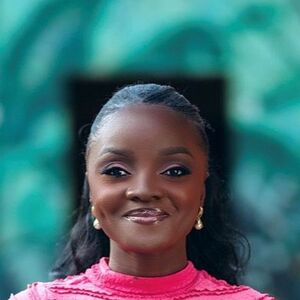
Omojo Rita Ajuh
I am Ajuh Omojo Rita, a Nutrition Scientist at Nigeria’s National Space Research and Development Agency (NASRDA), with a strong passion for advancing astronaut health through nutrition and international research. My academic background includes a Bachelor’s degree in Human Nutrition and Dietetics from the Federal University of Agriculture, Makurdi. I am currently pursuing a Master’s degree with a focus on space nutrition at University of Nigeria Nsukka. My journey into space science began with a commitment to understanding how extreme environments, like microgravity, influence human biology. As part of my achievements in the space industry, I had the honor of presenting at the 2023 International Astronomical Union (IAU) Conference on “The Bio-Environmental and Health Impact of Artificial Light at Night,” where I emphasized the importance of protecting dark skies for human health and space sustainability. As someone from the Global South, I believe international cooperation is essential in shaping a more inclusive and effective future for space exploration. Also, collaboration across nations allows us to share diverse perspectives, develop holistic solutions, and ensure that all regions contribute meaningfully to the global space agenda. Being selected for the 2025 IAF Emerging Space Leaders Grant is a major milestone. It reflects a growing recognition of nutrition as a critical element of spaceflight. I am excited to engage with a global community of innovators, share insights from African scientific research, and work together toward improving astronaut health and fostering lasting international partnerships in space exploration.
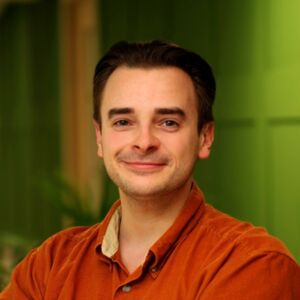
Billy Bryan
Billy is currently on secondment at the UK Space Agency as a senior space strategist. His work focuses on helping to set the direction of the Agency domestically and internationally, including the activities within the UK’s membership with ESA. He is seconded from RAND Europe, where he led the space policy business area and the RAND Europe Space Hub.
Billy’s main motivation for working in the space sector is to bring the benefits of space back down to Earth. He has led studies in the UK and Europe linking the results of publicly funded space R&D and missions to real world impacts. These have included work on the benefits of the UK’s membership of ESA, which showed significant positive results to UK industry and society, such as increased employment, climate monitoring and economic value. He has also led work on European access to space for DG DEFIS and explored the public benefits of UK Earth Observation programmes and reviewed UK science mission contributions such as JWST’s MIRI and Solar Orbiter.
He has published several papers advocating for new and better space traffic management systems in both Earth and Lunar orbit. He is an advocate for stronger and more inclusive cooperation in space, particularly in publicly funded science missions which inspire future generations and translate to public benefits here on Earth.
Billy is a member of SGAC’s Law and Policy Research Group and is a recipient of the European Space Leader Award and winner of the 2025 UNOOSA/SGAC Space4Youth Competition.
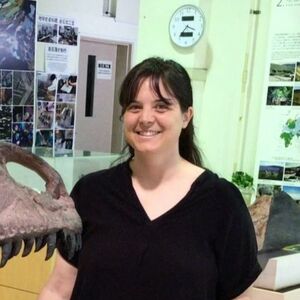
Selene Cannelli
A mix of archaeologist and microbiologist, I'm a PhD student at the Earth-Life Science Institute (Japan). I'm blending chemistry, geology, and microfluidic technology to explore the nanoscale interactions between minerals and organics, seeking clues to life's emergence on Earth and beyond. Outside academia, I'm a rugby athlete and explorer. But the road to arrive here wasn't straightforward.
Once convinced the Moon was following me, I put my space passion aside. Only 5 years ago, realizing that space is for everyone, I started to craft my path while advocating for this. I joined SGAC, leading a team to win the Moon Society 2020 Moon Base Design competition. Afterward, I became SGAC HR co-coordinator and then Italy Point of Contact (2022-2024). Curious to bring my archaeology background to space, I joined an analog astronaut mission (Analog Astronaut Training Center), creating the first analog habitat interactive museum. Driven to integrate archaeological practices into space exploration, I became interested in outer space environmental and human heritage protection policies. For this, I was selected as a 2022 ASCEND Diverse Dozen for the ongoing project "Earth's Orbits as a World Heritage Site." Space is interdisciplinary by nature, and that's what hooked me: the constant challenge to rethink and reinvent ourselves, and to bring people together. For this, I co-founded the first Astrobiology Graduate Conference Japan 2024, gathering a diverse and international community within Japan. We are now working to organize future editions and the first Asia Pacific Astrobiology Graduate Conference, bringing together astrobiology and space exploration students across the region.
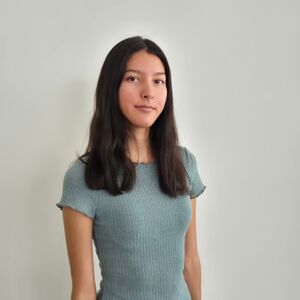
Celia Chavez Virgen
Celia Chávez Virgen is a Mexican undergraduate in Communications and Electronics Engineering at the Instituto Politécnico Nacional (IPN). Her current project at IPN’s Aerospace Development Center focuses on designing SDR-based emergency ground station networks to ensure resilient communication in disaster scenarios. At the Mexican Space Agency, she completed her social service as a Geospatial Analyst, where she developed national coverage maps for satellite, fixed, and cellular communications, directly supporting the Diagnosis of the Digital Divide in Mexico. Celia completed a research stay at Samara State Aerospace University in Russia on satellite formation flight for ionospheric studies and later joined Zhejiang University in China to work on distributed AI for semantic communications. She also interned at the National Institute for Materials Science in Japan, supporting ML-driven aerospace material discovery in collaboration with JAXA and CNES. As a BEIFI research fellow at IPN’s EMC Lab, she worked on electromagnetic interference analysis, renewable energy system signal mitigation, and wind power flow converters. She received Best Poster at IPN’s Institutional Research Forum, the IPN Academic Excellence Award, and completed an exchange semester with a full Magalhães/SMILE grant to study subjects such as GNSS and telecom systems at Universidad Politécnica de Madrid in Spain. She has presented at CONACES 2024, México’s largest space congress, and represented her university as an Ambassador at Oxford International in Canada. An active member of IEEE and WIE, she promotes STEAM outreach and Model UN diplomacy, and holds amateur radio training, supporting her work in satellite-ground communication systems. Her goal is to close connectivity gaps through integrated, space-based technological solutions. By combining telecommunications, AI, and space systems, she aims to build resilient infrastructure that empowers vulnerable regions and expands scientific frontiers.
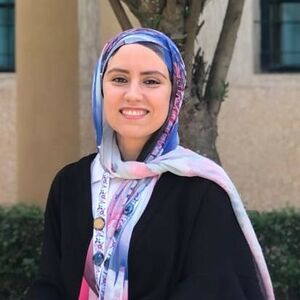
Amina Daghouri
As a researcher and professor at Mohammed V University in Rabat, Morocco, I specialize in the development and optimization of Electrical Power Systems (EPS) for nanosatellites. I was part of the team that recently launched Morocco’s first two CubeSats, UM5SAT-RIBAT and UM5-EOSat, under the leadership of the University Center for Research in Space Technologies (CURTS). My current research focuses on applying artificial intelligence to enable predictive maintenance in satellite power systems, with the goal of increasing their reliability and autonomy in both deep-space and constellation missions.
Being selected as an IAF grant recipient and having my abstract accepted for the International Astronautical Congress is a milestone in my professional journey. It affirms my dedication to merging cutting-edge technologies such as machine learning with the critical challenges faced in space system design. I believe that the future of space exploration depends on inclusive and equitable international cooperation. As space becomes more accessible, especially through small satellite missions, it is essential to ensure that emerging space nations are empowered to contribute. This requires open collaboration, capacity-building, and knowledge-sharing across borders.
I am proud to represent Morocco’s growing role in the global space community and excited to engage with peers from around the world. Together, we can work toward a future where space science and technology benefit all of humanity.
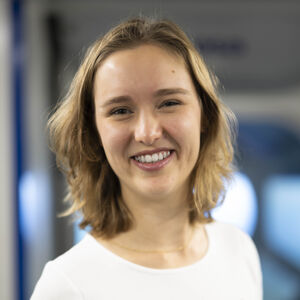
Nadine Duursma
Nadine Duursma is a double MSc student in Robotics and Space Engineering at Delft University of Technology, passionate about applying AI and autonomy to space missions. Her work has taken her from the Arctic, where she developed CubeSats and autonomous tracking systems at Andøya Space, to the Australian outback, where she raced 3,000 km with a solar car.
She contributed to NASA’s Lunar Gateway research during the Space Studies Program in Houston and currently works at ESA Φ-lab on AI-based Tip and Cue, a two-satellite concept for Earth observation. She also spent a semester at Princeton University, where she explored entrepreneurship, leadership, and teaching alongside her technical work.
Nadine is enthusiastic about making space accessible and engaging to all. To that end, Nadine authored the children’s book Met Mama naar Mars to inspire young minds, and co-hosts the national podcast BNR Space Cowboys, which brings space news to a broad audience in the Netherlands.
As the first Dutch recipient of the IAF Emerging Space Leaders grant, Nadine is committed to helping shape a space sector that is open, collaborative, and driven by curiosity, where people work together to achieve what once seemed impossible. Looking ahead, she aims to contribute to the advancement of space robotics and operations.
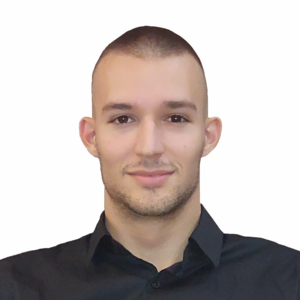
Marko Gavrilovic
Marko Gavrilovic, MSc, MSc (b. 1998, Belgrade) is a Research & Development Engineer and Mathematician working in the UK-German company on several HORIZON Europe and European projects, leading advanced mathematical and numerical modelling especially in the Aerospace and the Laser industry. He is a European Mechanics Society Member, and a member in European Cooperation is Science and Technology in several groups. As a Junior Research Assistant at the Astronomical Observatory, he works on several national projects, including the first Serbian satellite program and the national project for the computation of the Yarkovsky effect. He graduated and finished both Faculty of Mathematics and the Faculty of Mechanical Engineering, both with perfect GPAs (10.00/10.00) with the title the Best Student of Generation of Bachelor, Master and Overall studies including the title the Best student of generation given by the University of Belgrade.
His research spans theoretical and analytical mechanics, thermal-fluid mechanics, orbital dynamics, and advanced mathematical modeling. Marko’s master's thesis in Analytical Mechanics was the first of its kind at his faculty focusing on Quasi coordinates and the Euler-Lagrange differential equations for the complex system motions. His astrophysics thesis focused on the Yarkovsky effect on fast-rotating asteroids. He is pursuing two PhDs—one in Mechanical Engineering and one in Astrophysics.
Regarded as an Exceptionally gifted student of the Republic of Serbia, he won the Award for talented young researchers, first place in international competitions in Mechanics, several medals on national competitions, etc. In 2023, Blic magazine named him one of Serbia’s “Top 20 Most Remarkable Citizens.”
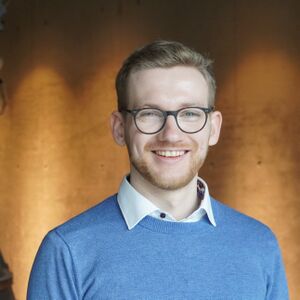
Moritz Herberhold
Moritz Herberhold is an aerospace engineer and PhD candidate at the German Aerospace Center (DLR), where his work is dedicated to making spaceflight more sustainable. As part of DLR’s S3D initiative, he develops the DLR Global Launch Emission Inventory—a state-of-the-art tool that models rocket launch emissions. His research aims to provide accurate emission data for understanding how rocket launches affect the atmosphere, ultimately contributing to global climate models and to sustainable rocket design.
Moritz’s journey in aerospace began with a focus on efficient flight systems, earning him the DGLR Young Talent Award for his work on design methods for fuel-efficient flying wings during his bachelor’s studies. He then joined ESA’s Space Debris Office for his master’s thesis. Here he developed a method for detecting low-thrust satellite maneuvers, which helps ESA to avoid collisions with satellites with electric propulsion, like the Starlink satellites. His expertise spans system analysis, environmental impact modeling, and international collaboration, making him a valuable contributor to sustainable space technologies.
Beyond research, Moritz shares his passion for space as a scientific advisor for Carlsen Publishing. In this role, he proofreads space-themed children’s books, ensuring they are both scientifically accurate and easy to understand for young readers.
For Moritz, space is a shared domain that requires collective responsibility. He believes that international cooperation is essential for sustainable space exploration, from ensuring safe satellite operations to minimizing the environmental impact of rocket launches. His goal is to promote a balanced approach to space exploration—one that advances technology while preserving the delicate environment of our planet.
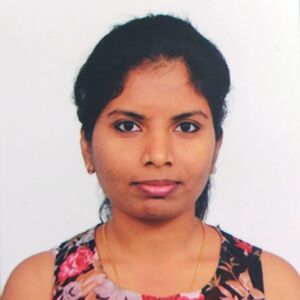
Bhavyashree Janardhana
Bhavyashree Janardhana is a space enthusiast and currently works as a Propulsion development & AIT Engineer at Polaris Spaceplanes. She holds a Master’s degree in Space Engineering from TU Berlin, where she focused on propulsion systems for hypersonic spaceplanes and advanced propellant supply systems. With a background in Aeronautical Engineering from India, she has worked as a research associate at premier Indian institutes, specializing in space structures and aerodynamics. Notably, she contributed to the aerodynamic and vibrational testing of the Indian space agency’s crew module in low-speed wind tunnel environments.
She is an active member of the global space community, having been part of the SGAC Alumni team since 2020. She served on the organizing team of SG[Germany] 2023 and currently holds leadership roles as Co-Event Manager and Finance Manager for SG[Germany] 2025, in addition to contributing to E-SGW 2024.
Bhavyashree is also a member of the Space Propulsion Committee of the International Astronautical Federation (IAF), engaging in the development of advanced propulsion technologies for deep space missions.
She strongly believes that space is a collective endeavor, requiring global cooperation to achieve meaningful and sustainable progress. Her work is driven by the conviction that inclusive collaboration and open knowledge-sharing are vital to advancing space exploration. By blending technical expertise with a commitment to international cooperation, she aims to foster a unified and forward-looking global space community.
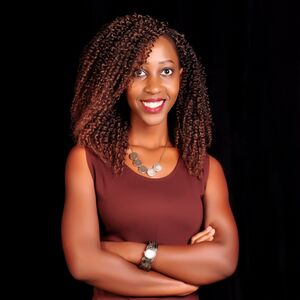
Charlynne Jepkosgei
Charlynne Jepkosgei is a geospatial engineer and visionary leader with over 7 years of experience working in Academia and consulting across private companies and government agencies. She holds a Master’s degree in Spatial Engineering from the University of Twente (ITC Faculty), Netherlands which has shaped her career growth in the space industry. Driven by a strong passion for space enabled societal development, Charlynne is focused on leveraging EO and AI to address pressing global challenges such as food insecurity, climate resilience and ecosystem degradation in Africa. Her work bridges research, capacity building, policy and governance thereby positioning her as a powerful voice for data-driven and inclusive decision making.
Also passionate about inspiring the next generation, she is the founder of Women in Space Kenya (WiSK), a professional organization dedicated to mentoring, inspiring and equipping young women in Kenya and across Africa to pursue careers in the space and geospatial sectors and even grow into space leadership. Through this initiative, she currently aligns her work with the Kenya Space Agency, UNOOSA Space4Women and the African Union’s Agenda 2063 to ensure inclusive and gender responsive growth in the continent’s space ecosystem. In 2023, she was a selected participant and facilitator at the 5th UNOOSA Space4Women Expert meeting contributing to the implementation of the Gender Mainstreaming toolkit and developing strategies to explore impact to the marginalized communities.
Charlynne believes that space is a unifying domain with immense potential to solve real-world problems when guided by inclusive, ethical and cooperative principles and thus is committed to advancing innovation, international cooperation and leadership in space science. She envisions ESL as a great opportunity that will not only empower her to amplify Africa’s voice in global space dialogues with other leaders but also reaffirms her commitment to leveraging space technologies for sustainable development.
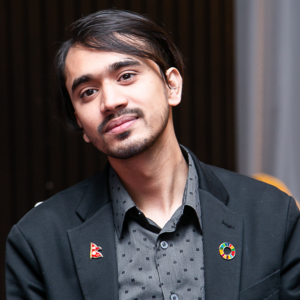
Ankit Khanal
Ankit Khanal, a driven young professional from Nepal, is making significant strides in global space collaboration and innovation. Serving on the International Astronautical Federation’s (IAF) Advisory Committee on History Activities, representing the Space Generation Advisory Council, he researches the Space Industry's history in Asia, demonstrating his commitment to preserving international space cooperation. His dedication to bridging technical and policy frameworks aligns seamlessly with the IAF’s mission to foster international dialogue and sustainable space development.
His career uniquely blends technical expertise with visionary leadership. At the Space Research Centre of Nepal Academy of Science and Technology (NAST), he conducted research on the Need for Space Law and Policy in Nepal. During his time on the Nepalese Space Research Association Board of Directors, he championed Nepal's National Space Law and Policy and significantly increased youth engagement in STEM. His global outreach includes roles with NASA’s Scientist for a Day and Astronomers Without Borders, fostering scientific curiosity through hands-on education.
Holding a Computer Engineering degree, Ankit applies his skills to innovative projects in AI, IoT, and application development. His certifications in UNOOSA Space Law and NASA Open Science highlight his dedication to ethical innovation in emerging space nations.
Ankit's participation in international forums like IAC and COY underscores his commitment to global challenges. As an IAF Emerging Space Leader 2025, he aims to amplify underrepresented voices in space policy, advocate for equitable access, and inspire future generations through STEM mentorship. His journey embodies the IAF ESL spirit: curiosity, leadership, and a passion for uniting the world through space.

João Lousada
João Lousada is currently the ISS Operations Service Lead, at the European Space Agency, being responsible for the European operations onboard the International Space Station.
He has worked previously as a Flight Director for Columbus, the European module of the International Space Station. As such, he was responsible for the planning and the operations of the module, as well as the safety of the astronauts on board. He was the lead flight director for several ESA missions and projects, in particular during Increments 65 and 67, where he was responsible for the Alpha and the Minerva missions, of ESA astronauts Thomas Pesquet and of Samantha Cristoforetti, respectively.
He is an active member of the International Astronautical Federation’s Human Spaceflight Committee and Young Professionals Program Committee, as well an alumnus of the Space Generation Advisory Council, where he undertook several leadership positions, including being elected regional coordinator for Europe.
João is also an analog astronaut and commander of Mars analog missions for the Austrian Space Forum (OeWF). The most recent of these missions took place in Israel, in the Negev desert, where he spent 4 weeks isolated in the desert, with a small team simulating a future mission to Mars.
He graduated from the Instituto Superior Técnico, in Portugal, with a Master's degree in Aerospace Engineering that included studies at the Universitat Politecnica de Catalunya, in Spain, and the University of Victoria, in Canada.
João enjoys traveling, exploring, running, climbing, SCUBA diving, skydiving and piloting.
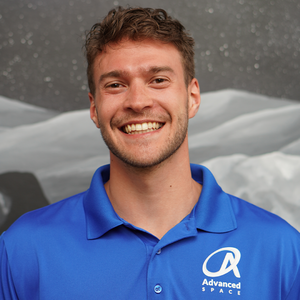
Patrick Miga
Patrick is currently an Astrodynamics Engineer and Solutions Architect at Advanced Space, where his functional role is that of the Space Domain Awareness (SDA) and Space Traffic Coordination (STC) Portfolio Lead. In this role, Patrick operates at the crossroads of engineering, business development, and project management - bridging the gap between user needs and innovation in SDA and STC technologies. His primary focus is the advancement of these capabilities within the cislunar orbital regime, though his passion extends to improving safety and sustainability across all areas of spaceflight.
Patrick holds a Bachelor of Science in Aerospace Engineering from the Georgia Institute of Technology, and dual Master’s degrees in Aerospace Engineering Sciences and Engineering Management from the University of Colorado, Boulder. In graduate school, his research explored space-based observability of cislunar satellites and led him to derive an analytical equation to estimate observability for relative motion amongst objects. He was selected for the 2nd class of Matthew Isakowitz Fellows in 2019 and he currently serves as the Vice President of Education at his local Toastmasters International club in Denver.
Given the nature of astrodynamics, Patrick firmly believes that space is inherently international; SDA and STC are important considerations for every object launched into space from any nation. International collaboration is mutually beneficial to all spacecraft operators – by enhancing these partnerships, there is a significant reduction in risk from collision events.
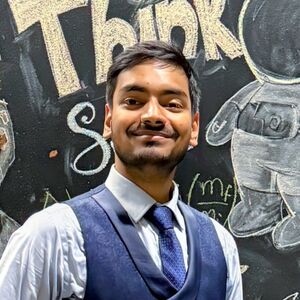
Ashutosh Mishra
I am Ashutosh Mishra, a doctoral researcher at Tohoku University’s Space Robotics Lab in Japan, working under the national Moonshot R&D program. My research focuses on the development of autonomous, modular robots for lunar missions, with the goal of enabling long-term human presence in space. These AI-powered systems demonstrate self-reconfiguration, adaptive mobility, and decentralized learning to support tasks such as navigation, construction, and resource utilization in unknown lunar environments.
I have conducted successful demonstrations of autonomous control, self-assembly, and lunar task simulations using in-situ materials at JAXA facilities. In one notable test, our modular robots identified simulated habitat leaks—reducing astronaut risk by detecting hazards without human exposure. My work has been featured in various media outlets and reflects a broader vision: enhancing mission safety, sustainability, and efficiency through robotics.
Beyond research, I’m passionate about democratizing space. As a Japanese MEXT Scholar and Indian Innovation Ambassador, I mentor students from underrepresented communities and promote inclusive access to STEM education. Through my long-standing involvement with NGOs, I help deliver science outreach to underserved regions in India.
I was also honored with the I-CON Award by the Indian Society of Remote Sensing (ISRS) for developing an AI-enabled satellite-based pollution tracking system with NRSC–ISRO, addressing critical Earth observation challenges.
At IAC 2025, I look forward to sharing how modular robotics, systems thinking, and inclusive design can drive equitable exploration and empower diverse future space missions.
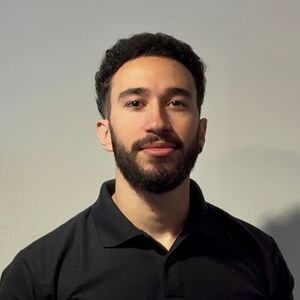
Lucas Mitidieri
From a young age, I have been fascinated by understanding how things work and by building prototypes with available materials. This curiosity led me to study Mechanical Engineering and to start a small 3D printing business, which continues to support my studies and provides practical experience in creating parts with technical designs and materials.
Currently, I am developing a 3U deployer for CubeSat satellites. I built an initial prototype using 3D printing in line with aerospace standards and conducted expulsion tests at my university’s lab to evaluate its core functionality. The project is still in progress, and I am investigating the use of high-performance polymers to create a fully operational version that is both lightweight and a cost-effective alternative to aerospace-grade aluminum. This stage of the project continues to inspire me and expand my skills.
Being selected to attend IAC 2025 in Sydney is a great honor and opportunity for me. Coming from Argentina, where access to the space sector is more limited, this experience means a lot. It allows me to share what I’m working on, receive feedback, and connect with people from different backgrounds who are also passionate about space.
I believe international cooperation in space is essential. It brings people from around the world together to exchange ideas and learn from each other. This shared effort makes our work stronger, more innovative, and more meaningful.
I’m truly grateful for this chance, and I’m excited to keep growing through everything I’ll learn during this experience.
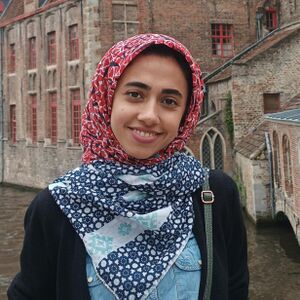
Sima Moradinasab
Sima Moradinasab is a Ph.D. Graduate in public international law from Shahid Beheshti University (SBU), specializing in space law. As a talented student, she also earned her bachelor’s degree in law (2018) and her master’s degree in public international law (2020) from SBU. Sima, as a visiting researcher, conducted and completed her doctoral research at the International Institute of Air and Space Law (IIASL) of Leiden University. She has also written and published several articles on space law.
Sima is eager to fostering space law discourse, especially among young generations. To achieve this, she gives lecture for law students. She has also participated in international conferences, including the International Astronautical Congress (IAC) where she has presented her research on space law issues. She has also been one of the selected speakers of the 2022 Young Lawyers’ Symposium organized by the European Centre for Space Law (ECSL).
Sima joined Space Generation Advisory Council (‘SGAC’) in January 2024 as a member of Space Law and Policy (SLP) Project Group (PG) and a team member of Space Generation Advocacy and Policy Platform. She currently serves as the National Point of Contact for Iran and co-leads the research group within the SGAC SLP PG. She is also an individual member of the International Institute of Space Law (IISL).
Sima firmly believes that international cooperation is essential for space exploration. It not only enables non-space-faring nations to access outer space, but plays a vital role in ensuring the long-term sustainability of space.
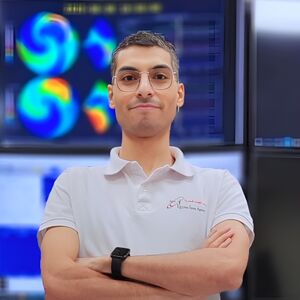
Hassan Nooreldeen
Hassan Nooreldeen is a Space Weather Engineer at the Egyptian Space Agency (EgSA), where he leads research and operations at the Egyptian Space Weather Center. He holds a B.Sc. and an M.Sc. in Space Science from Helwan University; his master’s thesis pioneered AI-driven forecasting of ionospheric irregularities over Egypt using deep-learning techniques.
Hassan’s work focuses on unraveling how solar activity impacts Earth’s magnetosphere and ionosphere. By integrating high-resolution local datasets with advanced machine-learning approaches, he has led studies of geomagnetic storm effects across the MENA region.
He contributes as a Space Weather Engineer on key national space missions in remote sensing and space exploration, ensuring each satellite can withstand hazardous space environment conditions. An active researcher, he publishes in leading peer-reviewed journals and presents regularly at international conferences and workshops.
Hassan now aspires to pursue a PhD in Space Weather under expert supervision, aiming to advance forecasting capabilities and deliver comprehensive services across North Africa, the Mediterranean, and beyond.
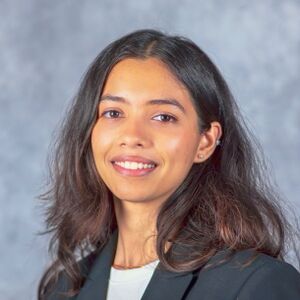
Shachi Singh
Shachi is a PhD student in Mechanical Engineering at Johns Hopkins University, USA. Her research focuses on hypervelocity impacts into porous geomaterials, with applications in planetary defense. She has presented this work at the MACH Conference, where it received the People’s Choice Best Poster Award, the Lunar and Planetary Science Conference, and at the ISRD workshop in Grenoble, France. Beyond research, Shachi is passionate about actively contributing to the academic community through advocacy, outreach, and leadership. At Johns Hopkins, she serves as the Vice President of the Mechanical Engineering Graduate Student Association, represents her department in the university-wide Graduate Student Organization, and serves on the Vice Provost’s PhD Student Advisory Committee.
Growing up, she was fascinated with the infiniteness of the night sky, which inspires her passion for space. She completed her B.Tech in Mechanical Engineering at IIT Roorkee, India, where she worked on the design and deployment of origami booms for space applications. She received the IIT Roorkee Excellence Award in both 2021 and 2022 for her all-round contributions across academics, leadership, and extracurriculars. After graduation, she worked as a Wireline Engineer at Schlumberger in India and the UAE before starting her PhD.
Shachi is enthusiastic about creating “space” for cross-border conversations and collaboration in the global space community to propel the shared space journey of humanity. She believes that international platforms like the IAC are vital to ensure that the future of space is shaped by inclusive, global cooperation.
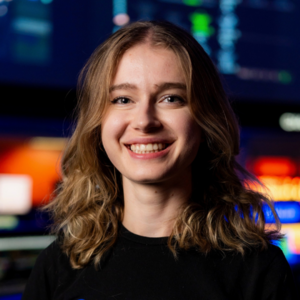
Julia Stankiewicz
Julia is a young professional at the European Space Agency, contributing to the Lunar Gateway program. She supports the Life Support Equipment and Structures subsystems for ESA’s habitation and refuelling modules. Her greatest passion is exploration—both of space and diverse cultures.
During her studies, Julia gained professional experience at organizations such as NASA JPL, Rolls-Royce, and Planet Labs. She has lived in six countries and studied in four languages. She holds Bachelor’s and Master’s degrees in Aerospace Engineering from the University of Manchester and the Technical University of Munich. She is also an alumna of the International Space University and was awarded the Brooke Owens Fellowship in 2020.
Julia is deeply committed to STEM outreach. She had the honor of representing Poland at the United Nations and participated in the “Women in Science Leadership” panel. Furthermore, as part of ESA's ESERO outreach initiatives, she conducts space-themed lectures for Polish students.
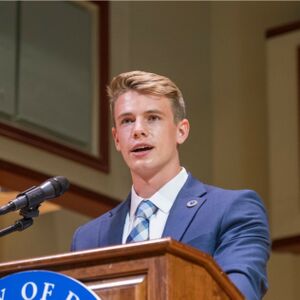
Brenden Swanik
Like many involved in the IAF, space is a vocation for Brenden Swanik. Born in New Jersey and currently based in Washington, D.C., Brenden is a native of the U.S. East Coast. Through his work with Voyager Technologies and Chasing Space LLC, he has had the opportunity to travel widely, build connections across borders, and help foster an inclusive international space economy.
With a background in biomedical engineering, Brenden leads the Satellite Mission Management team at Voyager Technologies, where he oversees the integration, launch, and deployment of satellites from the International Space Station (ISS). He has managed more than 40 satellite missions across five distinct launch campaigns, spanning a range of orbits and launch vehicles.
Inspired by the power of international collaboration to overcome both technical and bureaucratic barriers, Brenden also serves as the Founder and Host of Chasing Space, a podcast dedicated to opening access to the space sector for young and underrepresented communities. The show has reached over 6,000 listeners across more than 50 countries—many in regions with emerging space economies.
In addition to his engineering and outreach work, Brenden regularly speaks at conferences and events across the U.S. He also volunteers at K–12 schools, sharing his experiences to inspire the next generation of space professionals. In his spare time, Brenden enjoys playing guitar, surfing, and competing in athletic events such as triathlons, HYROX, and running races.
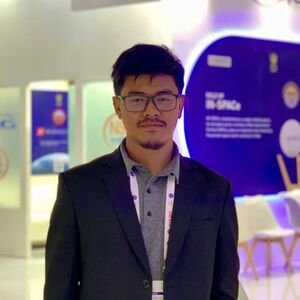
Mohan Tamang
Mohan Tamang is a young space enthusiast from Nepal and the founder of Mach24 Orbitals, a launch vehicle startup focused on making space access more inclusive, particularly in the Asia-Pacific region. He has been a driving force in developing grassroots space initiatives in Nepal, combining technical innovation with public outreach to build a sustainable space ecosystem in a developing country context.
With over a decade of dedication to social and space entrepreneurships, Mr. Tamang has led multiple organizations with prominent roles such as SEDS-Nepal and National Innovation Center to foster space technology across the country. He also led the country’s first sounding rocket team to design, build, and launch an award-winning sounding rocket, recognized internationally at the Spaceport America Cup. Apart from engineering, he has reached over 10,000+ students through workshops and hands-on programs in rocketry and small satellites.
Currently his startup Mach24 Orbitals is working collaboratively with Space Research Center of Nepal Academy of Science and Technology (NAST) at their Makerspace, to develop hybrid propulsion-based suborbital rockets, targeting to reach KARMAN LINE. He envisions Nepal not just as a space user but as a contributor to the global space supply chain.
Mohan believes in redefining “Space for All,” advocating for international cooperation to bridge the technological divide between nations and making space more accessible for all. As an IAF Emerging Space Leader, Mr. Tamang embodies the values of leadership, inclusivity, and international engagement that define the next generation of global space pioneers.
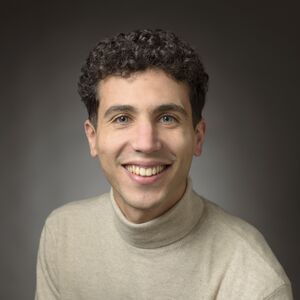
Iliass Tanouti
Iliass Tanouti is an aerospace engineer with a degree in Aerospace Engineering from the University of Manchester and a Master’s in Space Studies from the International Space University (ISU). He combines technical expertise with a passion for building equitable solutions and has experience driving international, cross-cultural, and multidisciplinary collaboration projects, which are key to ensuring the space industry succeeds for the benefit of humankind.
As Vice President of Delivery & Customer Success at constellr, Iliass ensures the successful delivery and operational excellence of cutting-edge thermal Earth observation data for environmental and agricultural applications, aligning with global sustainability goals.
He is also the Space Projects Lead at Je m’engage pour l’Afrique, a public policy incubator dedicated to empowering young individuals to become citizen entrepreneurs by ideating and promoting policy recommendations on critical issues for Africa's development. In 2024, through Je m’engage pour l’Afrique, Iliass led the publication of Drawing from Above, a unique book aimed at raising awareness among African policymakers of the many benefits the space industry can bring.
Recognized as one of the Top 10 Under 30 Africans in the Space Industry in 2020 , Iliass has also held roles such as Regional Coordinator for Africa at the Space Generation Advisory Council (SGAC) and Ambassador for Africa at the International Space University (ISU).
Iliass aims to shape a future where space technology drives sustainable development and empowers communities globally.
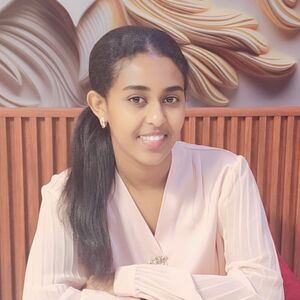
Emebet Mehabaw Tegegne
Emebet Mehabaw is an Ethiopian aerospace engineer specializing in satellite technology and space mission design. She currently serves as the Head of Satellite Communication and Infrastructure Development at Black Space, where she leads the development of advanced satellite communication systems. Her technical expertise spans CubeSat development, systems integration, and space mission planning and design, enabling her to deliver scalable and impactful solutions tailored to the unique needs of developing space programs.
With a strong foundation in engineering and leadership, Emebet combines hands-on technical skills with strategic vision to drive innovation across Africa’s growing space sector. Her dedication to expanding access to orbital technologies is reflected in her active engagement with global space communities.
Emebet is an Ambassador for the International Astronomy and Astrophysics Competition (IAAC), promoting science education and inspiring students across the region to pursue careers in STEM. Her efforts were recognized with the 2024 African Space Leaders Award, honoring her significant contributions to Ethiopia’s and Africa’s advancement in aerospace innovation.
In addition, she serves as the National Point of Contact( NPoC)for Ethiopia at the Space Generation Advisory Council (SGAC), where she mentors young professionals and supports the country’s emerging space ecosystem.
Driven by a passion for inclusion, mentorship, and technological advancement, Emebet continues to be a leading voice shaping a more equitable future in exploration and satellite development. She is a powerful advocate for inclusive space exploration, empowering the next generation of scientists and engineers while helping to position Africa as a vital contributor to the global space community.

Faith Tng
Faith is a space engineer currently at the German Aerospace Centre, towards completing her Masters in Space Engineering thesis on developing a multi-sensor suite for a lunar cave exploration rover. She started her career in Singapore’s space industry eight years ago by joining the first New Space startup in the country, helped to drive the first few space life sciences research experiments, and grew the local space entrepreneurship community to 700 members at peak. Later, she was selected for two fully-funded global venture capital fellowships, specializing in space and deeptech.
As the first Southeast Asian to be awarded the Pioneer Award from the Space Generation Advisory Council, Faith currently oversees its education and professional development organizational pillar for the 30,000-member organisation. She is also implementing a geospatial/AI project to track specific climate metrics in Southeast Asia, as part of the Youth4Climate grant awarded by the United Nations Development Program and Italian Ministry of Environment and Energy Security.
In leisure, Faith is a hackathon enthusiast who has won or ranked in the top percentile for seven space-related competitions. She believes space technologies are vital to securing our future amid breakneck industrial development, and that non-traditional sectors and ecosystems need to be engaged at the onset.
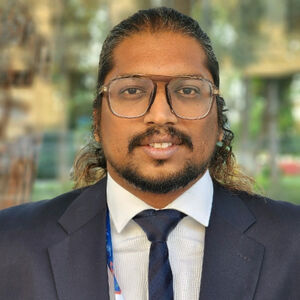
Nijanthan Vasudevan
Nijanthan Vasudevan is a robotics and AI researcher specializing in intelligent autonomous systems for space and extreme-environment applications. His academic and professional journey bridges mechanical design, machine learning, and multi-agent robotics, with a focus on AI-integrated perception, planning, and control. He has authored multiple peer-reviewed publications and presented his research at globally recognized venues including the International Astronautical Congress (IAC), ASME IMECE, and NDIA. At Drexel University, his research advances robust planetary navigation through high-resolution 3D LiDAR point cloud processing, multimodal sensor fusion with thermal and depth data, and pose-graph SLAM optimized for real-time edge inference. His reinforcement learning pipelines—leveraging Proximal Policy Optimization (PPO) and behavioral cloning—are trained in VR-based digital twins and deployed to physical robotic platforms for precision manipulation in unstructured environments. His graduate thesis presented a dual-arm, modular robotic platform enhanced by adaptive grasping and human-in-the-loop control via immersive VR. As co-founder of Astrada Cyberlabs LLC, a startup developing AI-driven swarm robotics for orbital debris mitigation, he leads the development of autonomous satellite tracking systems, decentralized multi-robot coordination architectures, and bio-integrated prosthetics utilizing myoelectric sensing. He is the named inventor on two pending patents in the domains of CubeSat-based debris removal and adaptive multi-modal mobility. As Research Lead within the Space Generation Advisory Council, he coordinated international teams to design AI-coordinated CubeSat swarms for sustainable orbital operations. Committed to inclusive innovation, he conducts outreach workshops and mentoring for underserved communities, championing a vision of resilient, intelligent, and equitable human expansion into space.
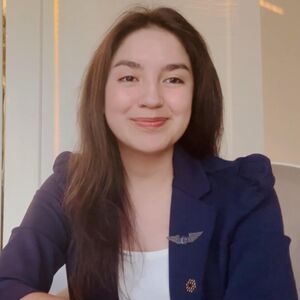
Nathalie Vilchis Lagunes
Nathalie Vilchis Lagunes is currently a Systems Test Engineer at Planet Labs, working on the company’s latest Earth imagery satellite missions, Pelican and Tanager. She holds a bachelor's degree in Mechatronics Engineering with a Minor in Applied Robotics from Tecnológico de Monterrey, Mexico. In recognition of her achievements, Nathalie was named one of Forbes Mexico's 100 Most Powerful Women in 2021 and included in Quién magazine’s list of 50 Personalities Changing Mexico. Key milestones in Nathalie's career include:
- Earning the Mitacs Globalink Research Internship to study multi-legged robots at Queen’s University, Canada.
- Being selected for the Caltech Space Challenge to develop a sample-return mission proposal to Titan.
- Receiving the prestigious Brooke Owens Fellowship for exceptional women in aerospace.
- Graduating from the Aurelia Institute Horizon 2024 Zero Gravity Program, where she developed microgravity research on soft robots, tested them on a zero-gravity flight, and presented her findings at IAC 2024.
- Being awarded the Nebula Award from the Space Generation Advisory Council.
Nathalie also founded of Chica NASA and Space Latinos initiatives designed to engage Latinx youth in space science and encourage women to pursue careers in STEAM fields. This year at IAC, Nathalie will present a follow-up to her previous research on soft robots in microgravity, now exploring their application as medical tools in space. Nathalie believes space exploration is humanity's greatest mission to understand where we come from and where we’re headed. She strongly thinks that it is the duty of those of us already in the space sector to facilitate opportunities for people from diverse backgrounds to contribute to this singular mission.
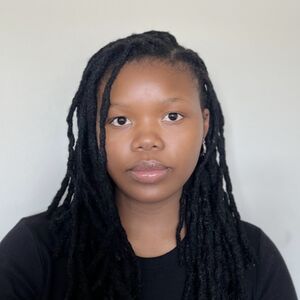
Kanya Xongo
Kanya Xongo is a Junior Remote Sensing Scientist at the South African National Space Agency, which dominates the space sector across the African Region. Her educational background in the use of Earth Observation data for environmental conservation deepened her passion for using science and technology to create meaningful environmental impact. Upon arriving at the space agency, her interests and passion have extended to climate change monitoring and air quality research.
Kanya’s most recent achievements, amongst many, was obtaining her Masters in Science from the Nelson Mandela University, with focus on exploring ecological restoration through Earth observation and geospatial analysis.
As an early-career professional, Kanya is committed to promoting inclusive access to space-based knowledge and tools. As such, she currently serves as an executive member of the SA Geo Youth—the first youth-led initiative under the global Group on Earth Observations. The SA GEO Youth mission is to ensure that young voices are actively shaping the future of Earth observation and space policy, especially from underrepresented regions like Africa.
Kanya believes that space is a shared resource with the power to unite the world in solving global challenges. International cooperation, open data, and inclusive capacity building are critical to ensuring that all countries, particularly in the Global South, can benefit from and contribute to the space sector.
Through the Emerging Space Leaders programme, I am excited to engage with a global community of peers and mentors, exchange ideas, and build long-term collaborations. I look forward to applying what I learn to strengthen my contributions at SANSA, continue empowering youth in Earth observation, and help grow Africa’s presence in the international space community.
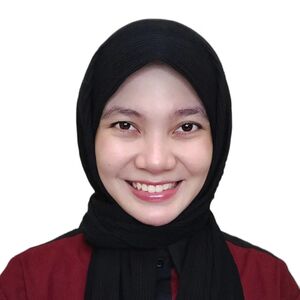
Farah Diya Yasmine
Farah Diya Yasmine is an Indigenous Madurese Indonesian, serving as a legislative drafter for the Secretariat General for the House of Representatives of the Republic of Indonesia. As a young leader and space enthusiast, Farah has contributed to almost 100 programs, often in leadership roles. Her work focuses on the sustainability of space resources, environment, and technology utilization.
As the founder and president of Farah Law School, she loves sharing lectures and opportunities on space with Indigenous students. Farah is a co-chair for the 2025 Lunar Environmental Protection Working Group 1 of the Global Expert Group on Sustainable Lunar Activities, examining space law instruments, especially with the approach to long-term sustainability. Within the SGAC, Farah performs as HR Recruitment Lead, Research Coordinator for the Near-Earth Object Project Group, and Event Coordinator for the Space Law and Policy Project Group. Her involvement advances to the 2025 SGAC ACHIEVED Competition as an expert and co-leading the Un-Inclusive Space Policy project within the SGAC Space Safety and Sustainability Project Group.
Farah was the official youth delegate of the Ministry of Youth and Sports of the Republic of Indonesia at the 2023 Global Youth Summit in Seoul, South Korea. Farah received a full-funding opportunity to present her thesis ideas at the 2023 World Space Forum in Vienna, Austria. As the first Indonesian ascendant, Farah received a grant from the AIAA to attend and speak at ASCEND 2025.
For Farah, space and international cooperation shall be translated into collaborative efforts with mutual benefits for past, present, and future generations.